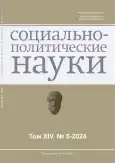Конституционный суд Российской Федерации и его роль в конституционно-правовом регулировании
- Авторы: Еремин А.Р.1
-
Учреждения:
- Национальный исследовательский Мордовский государственный университет имени Н.П. Огарёва
- Выпуск: Том 14, № 5 (2024)
- Страницы: 75-81
- Раздел: Российское государственное управление: страницы истории и современность
- URL: https://journal-vniispk.ru/2223-0092/article/view/282480
- DOI: https://doi.org/10.33693/2223-0092-2024-14-5-75-81
- EDN: https://elibrary.ru/RLKXYA
- ID: 282480
Цитировать
Аннотация
Цель исследования. Статья посвящена роли Конституционного Суда РФ в конституционно-правовом регулировании. Представляются доктринальные подходы к правовой природе и правовому статусу актов Конституционного Суда РФ. Изучается воздействие конституционной юстиции на правовую систему в России. Целью исследования является изучение роли Конституционного Суда РФ в конституционно-правовом регулировании. В статье используются диалектический, формально-юридический, логический, сравнительно-правовой и другие методы познания.
Выводы. В системе органов государственной власти Конституционный Суд РФ занимает особую роль в силу его особого правового статуса и особенностей полномочий. Нормативность итоговых решений Конституционного Суда РФ предполагает введение в действие, изменение, уточнение, отмену норм права. Данная функция органа конституционной юстиции играет значительную роль в развитии не только доктринальной стороны права, но и определяет формирование и преобразование законодательства как конституционного, так и отраслевого. Деятельность Конституционного Суда РФ как органа конституционного контроля также определяется как конституционное толкование норм законодательства в определенной сфере общественных отношений, что представляет собой важный механизм совершенствования правовой системы. Важной особенностью юридической природы и роли решений Конституционного Суда РФ являются их правопреобразующие свойства, состоящие в уточнении правоприменения норм законодательства различных сфер на основе раскрытия их конституционно-правового смысла и назначения. Способом правопреобразующего воздействия решений Конституционного Суда РФ является обоснование конституционно-правового смысла отдельных норм отраслевого законодательства с целью гармонизации отраслевых источников права с конституционными положениями и обеспечения правильного их применения.
Полный текст
Открыть статью на сайте журналаОб авторах
Алексей Роальдович Еремин
Национальный исследовательский Мордовский государственный университет имени Н.П. Огарёва
Автор, ответственный за переписку.
Email: eralro@mail.ru
ORCID iD: 0009-0000-6826-7869
Scopus Author ID: 57191504684
доктор юридических наук, профессор, заведующий, кафедра теории, истории государства и права и международного права
Россия, г. СаранскСписок литературы
- Бондарь Н.С. Нормативно-доктринальная природа решений Конституционного Суда РФ как источников права // Журнал российского права. 2007. № 4 (124). С. 75–85.
- Верещагин А.Н. Судебное правотворчество в России. Сравнительно-правовые аспекты. М.: Международные отношения, 2004. 344 с.
- Жадан В.Н. Роль и функции Конституционного Суда Российской Федерации в современной отечественной системе конституционного права и правовом регулировании // Образование и право. 2021. № 7. С. 190–198.
- Зорькин В.Д. Конституционный Суд России: доктрина и практика. М.: Норма, 2019. 592 с.
- Каблов Н.В. Решения Конституционного Суда Российской Федерации в системе нормативных источников // Вестник науки. 2022. № 3 (48). С. 67–74.
- Курочкина К.С. Конституционный Суд в судебной системе Российской Федерации // Молодой ученый. 2021. № 23 (365). С. 212–213.
- Маслова Б.И. Юридическая сила решений Конституционного Суда Российской Федерации в современных реалиях // Вестник магистратуры. 2021. № 8 (119). С. 86–88.
- Мешков И.В. К вопросу о правовой природе решений Конституционного Суда Российской Федерации // Национальная ассоциация ученых. 2023. № 87-2. С. 67–71.
- Митькова Ю.С. Правовая природа решений Конституционного Суда Российской Федерации и их значение для уголовного судопроизводства // Вестник Волгоградской академии МВД России. 2020. № 1. С. 95–108.
- Шабанов Х.Б. Правовые позиции Конституционного Суда Российской Федерации как источник права // Закон и право. 2020. № 7. С. 47–50.
Дополнительные файлы








